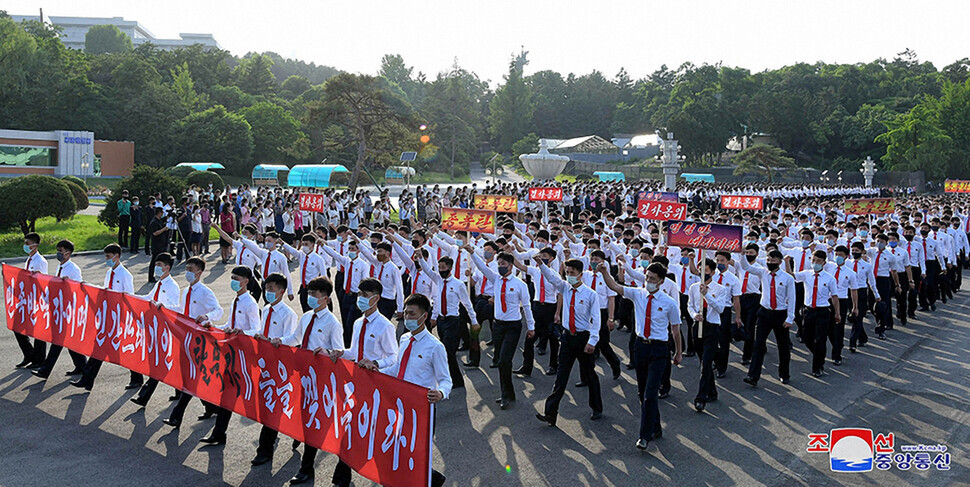hankyoreh
Links to other country sites 다른 나라 사이트 링크
[Editorial] South and North Korea are not enemies and need to step into each other’s shoes

North Korea announced that it would cut off all lines of communication with South Korea at noon on June 9 and start treating the South as an enemy. The North described this as the first measure in a step-by-step plan against the “enemy,” suggesting that additional measures are forthcoming. The Korean Peninsula stands at a major fork in the road, with one path presaging a return to the complete breakdown in inter-Korean relations prior to 2018.
Pyongyang’s action on Tuesday was in line with the June 4 statement by Kim Yo-jong, first deputy director of the Central Committee of the Workers’ Party of Korea (WPK), who objected to defector groups that have been launching balloons filled with propaganda leaflets into North Korea. The communication lines that North Korea abruptly severed on Tuesday are not only a basic means of inter-Korean communication but have also served as a barometer of inter-Korean relations.
When inter-Korean channels of communication were severed in early 2016, during the presidency of Park Geun-hye, following North Korea’s fourth nuclear test, inter-Korean relations were shut down as well. The inter-Korean communication lines at Panmunjom were restored on Jan. 3, 2018, after Moon Jae-in became president, and a high-level meeting on Jan. 9 marked the resumption of inter-Korean dialogue.
Among the various communication lines that were severed, the military lines on the east and west coasts and the hotline connecting the Blue House and the WPK Central Committee office building are particularly significant. Those lines had served as a safety mechanism to prevent the escalation of inter-Korean military clashes. The blue crab fishing season in the West Sea begins this month, prompting serious concerns that inter-Korean clashes might resume there.
There’s nothing new about the propaganda leaflets launched by defector groups. North Korea’s belligerent reaction to them in recent days appears to reflect both its growing frustration with and distrust of the South and the difficulties it’s facing at home and abroad. North Korea believes that the South hasn’t fully implemented three agreements that the two sides reached in 2018: the Apr. 27 Panmunjom Declaration, the Sept. 19 Pyongyang Declaration, and the Sept. 19 Comprehensive Military Agreement. Enacting a ban on the propaganda launches probably won’t be enough to resolve the current issue.
North Korea and the US haven’t made any progress in their talks since the inconclusive end of their second summit, in Hanoi, in February 2019. On top of the international sanctions it was already facing, North Korea closed its borders to prevent the spread of COVID-19, causing tremendous damage to its economy in the first half of this year.
Under these circumstances, North Korea needs an excuse to mobilize its people under the slogans of “self-sufficiency” and “frontal breakthrough.” Given the North’s desperate need for internal cohesion, it can hardly tolerate the launch of propaganda leaflets that overtly criticize North Korean leader Kim Jong-un, North Korea’s “supreme dignity.”
But even considering such difficulties, North Korea needs to take into account South Korea’s difficult position. After Kim Yo-jong’s statement, the South Korean government quickly announced plans to stop the propaganda balloon launches, despite the political fallout at home.
But North Korea ignored that response and has ratcheted up pressure on and criticism of South Korea day after day with harsh words and actions such as severing the phone lines. In a statement on June 5, the spokesperson of North Korea’s United Front Department said that “enemies are enemies after all” and warned that the North would “follow as far as the [. . .] confrontation leads.” It’s extremely regrettable for the North to adopt such an attitude.
Neither the North nor the South should push the confrontation to an extreme, and neither of them should regard each other as the enemy. This issue ought to be resolved through dialogue, even if that takes a while.
Please direct comments or questions to [english@hani.co.kr]

Editorial・opinion
![[Editorial] Yoon must halt procurement of SM-3 interceptor missiles [Editorial] Yoon must halt procurement of SM-3 interceptor missiles](https://flexible.img.hani.co.kr/flexible/normal/500/300/imgdb/child/2024/0501/17145495551605_1717145495195344.jpg) [Editorial] Yoon must halt procurement of SM-3 interceptor missiles
[Editorial] Yoon must halt procurement of SM-3 interceptor missiles![[Guest essay] Maybe Korea’s rapid population decline is an opportunity, not a crisis [Guest essay] Maybe Korea’s rapid population decline is an opportunity, not a crisis](https://flexible.img.hani.co.kr/flexible/normal/500/300/imgdb/original/2024/0430/9417144634983596.jpg) [Guest essay] Maybe Korea’s rapid population decline is an opportunity, not a crisis
[Guest essay] Maybe Korea’s rapid population decline is an opportunity, not a crisis- [Column] Can Yoon steer diplomacy with Russia, China back on track?
- [Column] Season 2 of special prosecutor probe may be coming to Korea soon
- [Column] Park Geun-hye déjà vu in Yoon Suk-yeol
- [Editorial] New weight of N. Korea’s nuclear threats makes dialogue all the more urgent
- [Guest essay] The real reason Korea’s new right wants to dub Rhee a founding father
- [Column] ‘Choson’: Is it time we start referring to N. Korea in its own terms?
- [Editorial] Japan’s rewriting of history with Korea has gone too far
- [Column] The president’s questionable capacity for dialogue
Most viewed articles
- 1Months and months of overdue wages are pushing migrant workers in Korea into debt
- 2At heart of West’s handwringing over Chinese ‘overcapacity,’ a battle to lead key future industries
- 3Under conservative chief, Korea’s TRC brands teenage wartime massacre victims as traitors
- 4[Guest essay] Maybe Korea’s rapid population decline is an opportunity, not a crisis
- 51 in 3 S. Korean security experts support nuclear armament, CSIS finds
- 6Fruitless Yoon-Lee summit inflames partisan tensions in Korea
- 7Trump asks why US would defend Korea, hints at hiking Seoul’s defense cost burden
- 8[Editorial] Yoon must halt procurement of SM-3 interceptor missiles
- 9Dermatology, plastic surgery drove record medical tourism to Korea in 2023
- 10First meeting between Yoon, Lee in 2 years ends without compromise or agreement